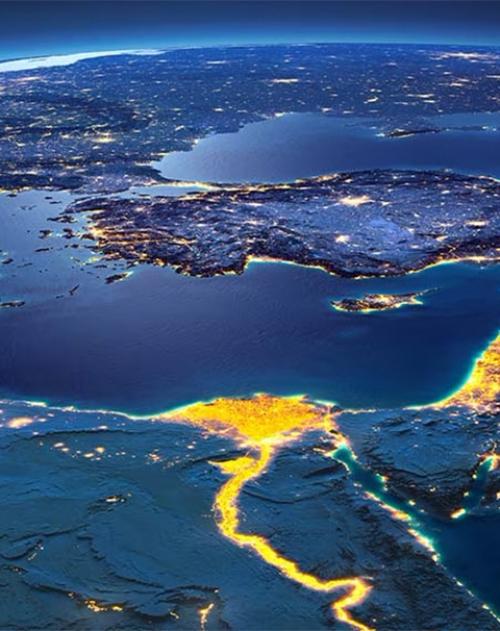If you have any questions or would like to get in touch, submit a call back request and our team will contact you as soon as possible or call us on 020 7499 6424 or email us at [email protected]
Conflict in the Middle East and investment strategy considerations

October has seen tragic events unfold in the Middle East. The conflict between Israel and Hamas that controls Gaza have quite rightly drawn the world’s focus to immense human suffering. There have been thousands of civilians killed in just the first few days alone, with many times more injured and whole communities displaced. With tensions in the region running high, there is a risk of the conflict escalating. With no easy long-term geopolitical solution in sight, early diplomatic efforts led by the US in recent days to try broker any sort of de-escalation face a massive challenge.
Against the human suffering that war brings, the interests of investors may understandably take a back seat. However, it’s crucial to acknowledge our responsibilities to those that place their trust in us with their savings. We have a duty to try to safeguard and nurture our clients’ funds, in whatever investment climate we find ourselves in, even in times of conflict.
Impact to the investment landscape
When considering the impact to the investment landscape and our resulting asset allocation choices, with any war, we must consider its ability to impact global markets. Who is at war? How long could it last? What is the likelihood that conflict will stay contained or escalate? What are the broader regional and global economic consequences, for example, disruption to global trade?
Another factor to consider at times of war, and especially so in the case of localised conflicts as is currently the case in the Middle East, is that there are always other economic and financial market forces acting. Separating out these investment drivers is critical to understanding the broader investment climate. Looking back to Russia’s invasion of Ukraine which started in early 2022, it coincided at a time which was already challenging to the investment backdrop, including inflationary pressures and sharply rising interest rates. Fast-forward to today, and the current Middle East conflict is coming at a time when underlying inflation pressures are well below their cycle peaks and are continuing to ease, coupled with central banks increasingly becoming more balanced on the path of interest rates, and with some level of cuts expected by the end of next year in the case of the UK, US and Europe.
An important point to remember is that, while war is undeniably devastating on a human level, it is one of several broader economic forces which, alongside investor sentiment, determine the outlook for financial markets. As unpalatable as it might seem, if the current Middle East conflict is contained without broader regional engagement, financial markets could start to place greater emphasis on the interplay of other economic factors. A prime example of this is the oil price. The oil price rose by around a third from early June to late September this year, reaching a recent high of over $97 per barrel (for Brent crude). This rise was principally on the back of voluntary supply curbs from Saudi Arabia and Russia, though it subsequently eased back to close to $84 a barrel in early October on concerns that interest rates in advanced economies might have to stay higher for longer should inflationary pressures re-emerge. As it stands, despite the breakout of a fresh war in the Middle East, the oil price at a little over $90 per barrel is below its recent highs.
While investors are rightly focused on fast-moving events in Israel and Gaza, currently we are also in the middle of the latest quarterly company results season, alongside an important time for central banks seeking to balance inflation risks versus economic risks. At the same time, estimates for US households’ accumulated excess savings have been sharply revised higher in recent weeks, complementing a picture of still-significant excess savings for consumers in many other countries globally. Coupled with resilient labour markets, where wages are starting to grow again in real terms (adjusted for inflation), all in all this suggests a relatively constructive investment backdrop. Meanwhile, global equity valuations are currently sitting a little under their longer-term 30-year average.
Conclusion
This all said, we cannot predict the outcome of events. Should the current conflict in the Middle East turn into a broader regional war, the balance of risks to the broader economy would clearly shift, which may warrant a more defensive asset allocation position. It is a reminder to stay humble and vigilant to how events might yet turn.
At the current time, we would reiterate our message from our just-published Q3 Quarterly Market Overview. That as we weigh up the investment outlook, the challenge for asset allocation is how to take a calculated position so that we maintain exposure towards more than one economic scenario materialising. Simply, there is not enough visibility currently to decidedly shift our investment weight behind a single expected sustained outcome. Instead, staying invested with a modest preference for equities over bonds, but keeping an equity-investment-style balance, continues to be our goal.
Request an initial consultation
Request an initial consultation
If you have any questions or would like to get in touch, submit a call back request and our team will reach out.
Get in touch
Get in touch
or call us on: 020 7499 6424
or email us at: [email protected]









